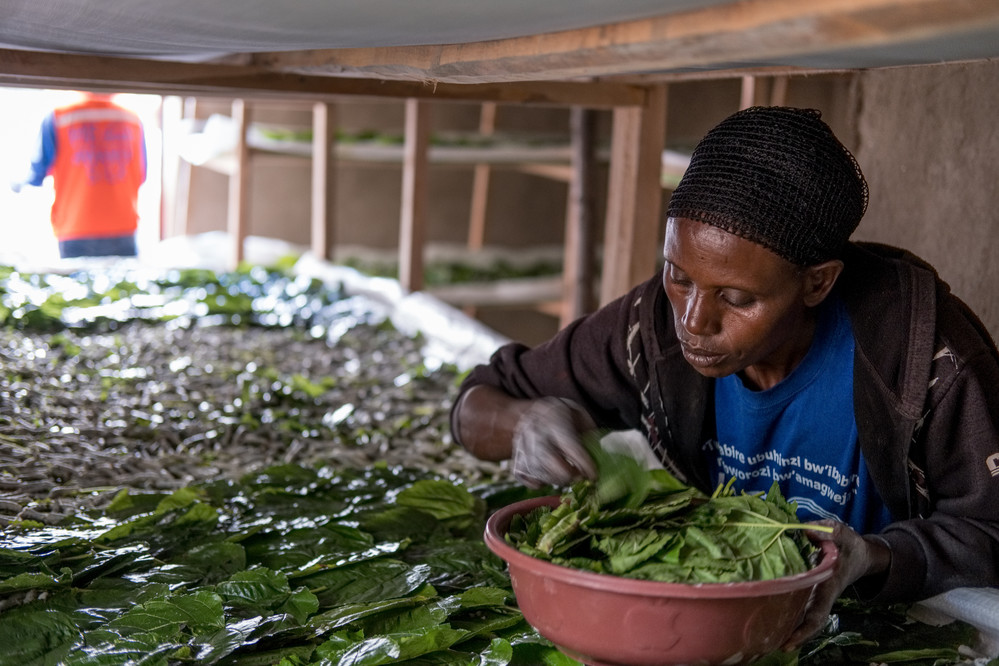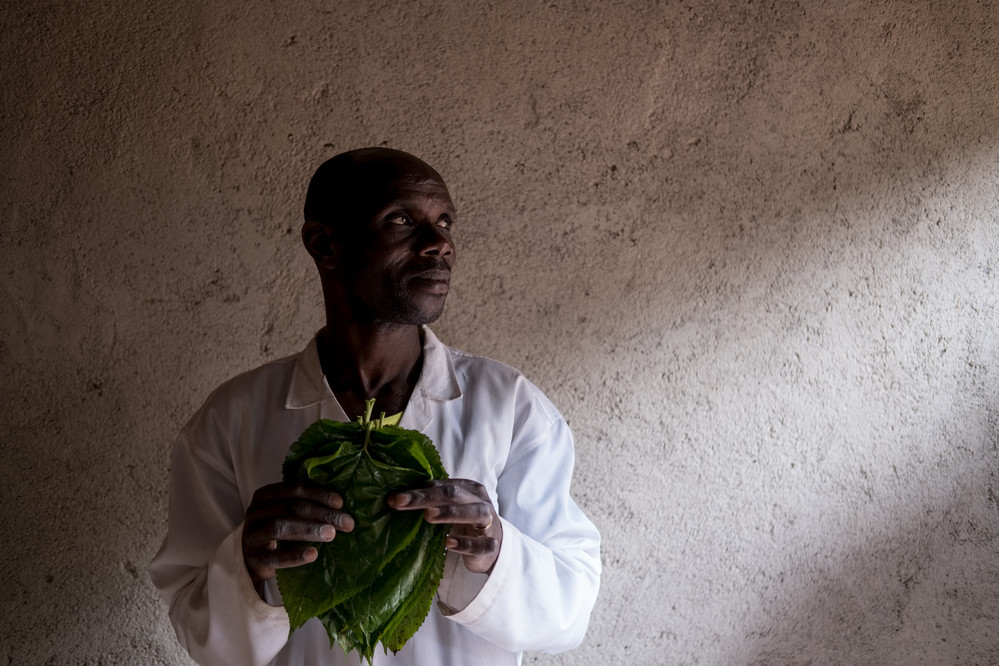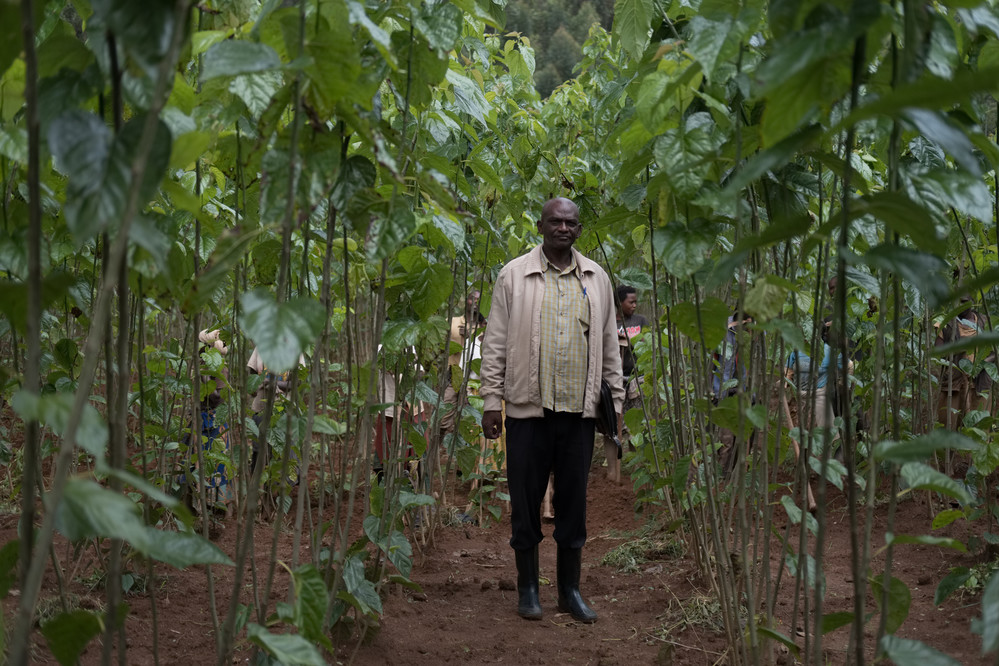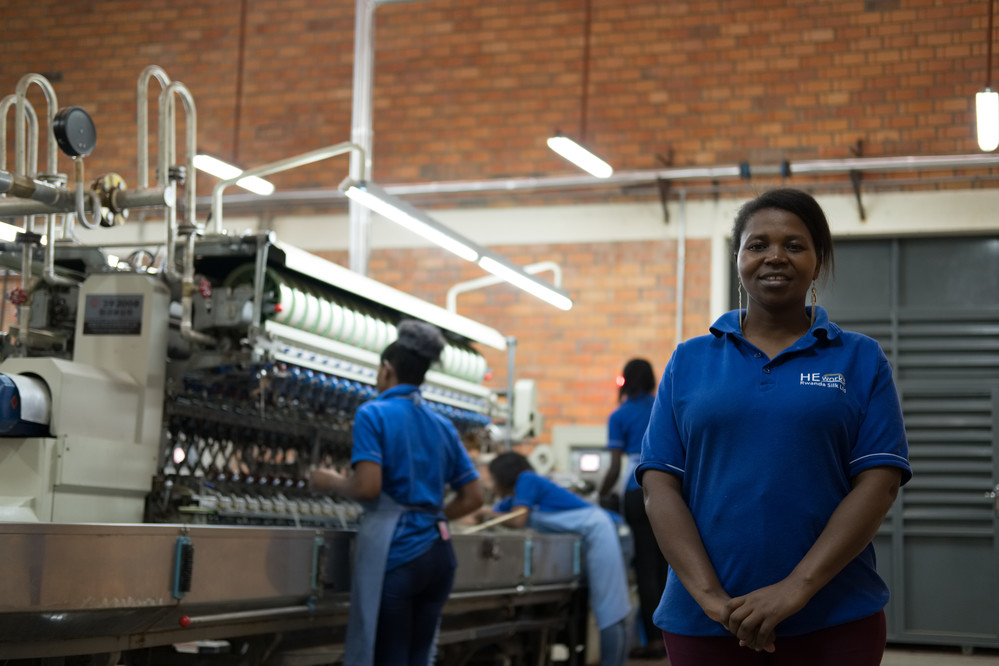Rwandan silkworm farmers weave links to global markets
IFAD Asset Request Portlet
Asset Publisher
Rwandan silkworm farmers weave links to global markets
Estimated reading time: 3 minutes
Forty-seven-year-old Rwandan farmer Pierre Kanyarwanda is enthusiastic. For the last five months, he has brought additional money home by applying his newly acquired skills in sericulture (silkworm rearing).
“I like it so much but it is not easy. It requires extreme caution and a lot of work to protect the worms from predators and diseases and feed them up to eight times a day. But when you want something, you make it work,” explains Pierre. Previously, he had worked all his life as a subsistence farmer, trying to make ends meet growing cassava, beans and bananas.
Silkworm rearing has opened up a brighter future for him.
“We now eat meat and rice at home, and I can pay my son’s school fees,” says this father of three. Currently employed at a silkworm-rearing farm, he is now saving to invest in his own silkworm operation.

@IFAD/Edward Echwalu - Pierre holds the mulberry leaves he uses to feed his silkworms.
Pierre is one of the 5,000 farmers who are benefiting from the development of sericulture under IFAD’s Project for Rural Income through Exports (PRICE) in Rwanda.
A pioneer among African nations, the Government of Rwanda has begun investing in the development of silk value chains. With rising demand from Asia, the production of high-quality silk products offers strong export opportunities.
To tap into growing global markets, Rwanda’s National Agricultural Export Development Board (NAEB) has partnered with HEWorks, a Korean silk manufacturer.
“Finding an investor has not been easy. Potential investors were afraid, because sericulture is new for Africa, but HEWorks decided to invest when they saw how closely we work with farmers,” explains Jean-Marie Vianney Munyaneza, emerging commodity division manager at NAEB.
With the support of the PRICE project, HEWorks and the Government of Rwanda have built a silk processing factory in Kigali’s Special Economic Zone. HEWorks manages the factory and buys cocoons directly from farmers, thus benefiting from a reliable and quality supply. The PRICE project also funded the opening of a national sericulture training centre and a silkworm egg production centre, as well as the rehabilitation of six additional provincial sericulture centres to support farmers’ silkworm-rearing activities.
The national egg production centre is a critical component of the silk value chain. In addition to its research activities, it oversees the maintenance of the entire silkworm race, from establishing lineages for the parent seed crop to producing disease-free eggs and ensuring a sufficient supply of silkworms for rearing.
Over the past few months, silkworm rearing has become an attractive activity for thousands of farmers in the hills of Rwanda. To boost cocoon production, HEWorks has progressively increased the price it pays farmers for them, from US$2 per kilogram in October 2016 to nearly US$4 in October 2019.
Celestine Ruzindana, Pierre’s employer, is one of many farmers who have invested in sericulture. With the help of HEWorks and the PRICE project, Celestine planted 14,000 mulberry trees to feed worms and built a rearing house. In addition to selling cocoons to HEWorks, Celestine also supplies young silkworms to other farmers. All told, silkworm rearing brings him a revenue of more than US$1,500 a year.
Celestine’s efforts also create work for his community. He employs six permanent workers in the worm nursery and 16 temporary workers in the mulberry plantation. He is investing in an additional two hectares of land to grow more trees and build an additional nursery.

@IFAD/Edward Echwalu - Celestine pauses for a photo in his mulberry garden.
Sericulture creates employment opportunities for young people in urban areas, too. The silk processing factory in Kigali has been operational since February 2019 and employs 34 permanent staff, 18 of whom are women, many of them university graduates.
“I like working here. It is very interesting because our operations are performance-based, we need to produce the best,” explains Emanuel Uyisenga, a 30-year-old employee who works in the factory’s testing room and holds a university diploma in chemistry.
NAEB’s strategy is to produce high-quality products and fetch premium prices of US$50 to US$70 per kilogram on international markets. Already, 50% of the silk yarn produced is rated 6A, the highest-quality grade on the market, and a further 40% is rated 5A. To generate additional income, the lower-grade cocoons are also used to make silk sheets.

@IFAD/Edward Echwalu - Dative shows us the reeling machine in Kigali’s silk factory.
“We can grow many things in Rwanda but importantly we can add value,” says Dative Ingabire, the 30-year-old manager of the silk factory, a law graduate from the University of Rwanda.
Dative is optimistic about the future of sericulture.
“I hope silk production will inspire other African countries to invest in sericulture as well and this will lead to locally produced silk products on the continent,” she says.
Learn more about IFAD’s work in Rwanda.
Publication date: 02 March 2020